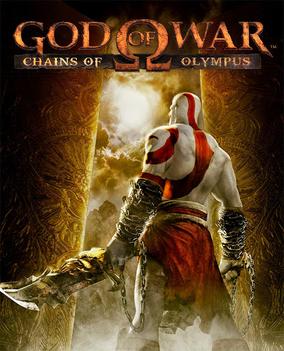God of War: Chains of Olympus
| God of War: Chains of Olympus | |
|---|---|

North American box art
|
|
| Developer(s) | |
| Publisher(s) | Sony Computer Entertainment |
| Director(s) | Ru Weerasuriya |
| Writer(s) |
|
| Composer(s) | Gerard K. Marino |
| Series | God of War |
| Platform(s) | |
| Release date(s) | |
| Genre(s) | |
| Mode(s) | Single-player |
| Aggregate scores | |
|---|---|
| Aggregator | Score |
| GameRankings | 91.44% |
| Metacritic | 91/100 |
| Review scores | |
| Publication | Score |
| 1UP.com | A |
| Eurogamer | 8/10 |
| G4 | 5/5 |
| GamePro | 4.75/5 |
| GameSpot | 8.5/10 |
| GameTrailers | 9.3/10 |
| IGN | 9.4/10 |
| Modojo | |
| Cheat Code Central | 4.6/5 |
God of War: Chains of Olympus is a third-person action-adventure video game developed by Ready at Dawn and Santa Monica Studio, and published by Sony Computer Entertainment (SCE). It was first released for the PlayStation Portable (PSP) handheld console on March 4, 2008. The game is the fourth installment in the God of War series, the second chronologically, and a prequel to the original God of War. It is loosely based on Greek mythology and set in ancient Greece, with vengeance as its central motif. The player controls Kratos, a Spartan warrior who serves the Olympian Gods. Kratos is guided by the goddess Athena, who instructs him to find the Sun God Helios, as the Dream God Morpheus has caused many of the gods to slumber in Helios' absence. With the power of the Sun and the aid of the Titan Atlas, Morpheus and the Queen of the Underworld Persephone intend to destroy the Pillar of the World and in turn Olympus.
The gameplay is similar to the previous installments, with a focus on combo-based combat, achieved through the player's main weapon—the Blades of Chaos—and secondary weapons acquired throughout the game. It features quick time events that require the player to complete game controller actions in a timed sequence to defeat stronger enemies and bosses. The player can use up to three magical attacks as alternative combat options. The game also features puzzles and platforming elements. The control setup was reconfigured for the PSP, as it has fewer buttons than the PlayStation 2's controller. Ready at Dawn's solution for the controls received praise from critics.
...
Wikipedia
